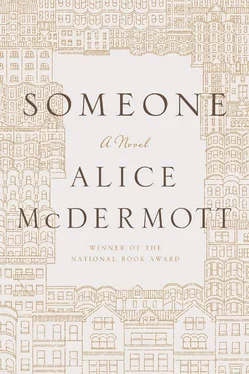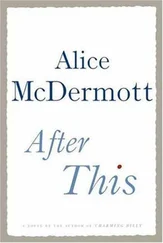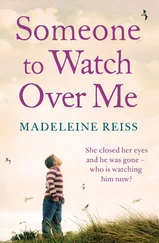“To tell you the truth,” he said, “the damn Church is blind to life sometimes, blind.” And then blessed himself and begged my pardon. “And don’t dare tell anybody I said so.”
It was the beginning of the evening of the second day of the wake. Because the parish priests had to show their disapprobation, it was Fagin who had led the Rosary the night before and would do so again tonight. There would be another crowd, mostly the same neighbors who had been here last night, many of whom had been here this afternoon as well. And would be again tomorrow. But for now it was just old Mrs. Corrigan with her stooped sister and her middle-aged niece, back from dinner and resettling themselves in the front row of chairs—but not before they had, it was a ritual I had observed many times by now, looked into the coffin again, as if to check for any changes while they were gone. I saw Mrs. Corrigan brush a bit of something, nothing most likely, from her big son’s lapel. Only a habit of mothering.
It was during Bill Corrigan’s wake that I considered for the first time what an effort of will it must have been for Mrs. Corrigan, over all these years, to keep her son in his neat suit and his pressed shirt and his polished shoes day after day. I wondered if it hadn’t been the suit all along that gave Bill Corrigan his skills as an umpire, his second sight—at least as far as the boys in the street were concerned. A transformation, it occurred to me then, not unlike the one Mr. Fagin’s five dresses had worked in my life.
I stood in the doorway as the three woman settled in. I still had my glasses on. I had added more remembrance cards to the small stand—Mrs. Corrigan had chosen one meant for children: a small boy with a great winged guardian angel by his side, knocking on heaven’s door—and I was just turning to a new page of the visitors’ book when I looked up and saw a subtle shift in the yellow sidelight beside the front door. A small shadow passing under the electric lamp at the entrance that to my now-practiced eye meant a visitor had arrived. Before I had a chance to take my glasses off, the big door was slowly pushed open and Walter Hartnett limped in. It was the limp, of course, I knew, that had kept him from the war.
He took off his hat and looked around. He had not changed much. His hair might have thinned a bit. His face might have been a bit fuller. A little heavier altogether, I thought, as he saw me in the doorway and smiled—same grin—and made his way across the vestibule. I smelled the liquor on his breath as soon as he spoke.
“Hello there, Marie,” he said, same wide-open grin and nice gray eyes, edged now in red, and suddenly, even before I had a chance to say, “Hello, Walter,” filling with tears. “May I take your hat?” I asked him. He gave me the hat, and then his eyes rose away from my face, to the room beyond me, to the women in their chairs, and then to the coffin where Bill Corrigan lay. Walter raised his chin and turned his head to where his eyes had already taken him. “This is a hell of a thing, isn’t it?” he said. And a large tear ran down his smooth cheek. “Old Bill,” he whispered. “What did he want to do that for?” and limped into the room.
Undone, I watched him from the door as he went to the coffin and knelt before it, the built-up shoe cast awkwardly behind him. He bowed his head, putting his forehead against the back of his folded hands. He remained like that, bent and still, for a good minute or two—old Mrs. Corrigan and her sister and her niece watching him respectfully—and then we all heard him gasp and saw his shoulders quake, rhythmically, it seemed, in a series of silent, roiling sobs.
At this point, the front door opened again as more visitors arrived, and I slipped off my glasses and turned my attention their way. When I looked back, the blur that was Walter was shaking hands with Mrs. Corrigan. He seemed to be speaking earnestly.
I watched him limp to the far corner of the room and throw himself into the farthest chair in the last row. He wiped his nose on his sleeve, ran his hands over his face and then through his hair, and then he reached into his suit jacket for a handkerchief, which he held to his nose for a moment and then returned to his inside pocket. I grew busy then, taking hats and coats into the cloakroom, greeting the same people I had greeted the night before. When I glanced back at Walter, he was once again reaching for the handkerchief inside his jacket, and this time I recognized the gesture for what it was, a reenactment of the problem-with-drink pantomime of the ladies upstairs. I knew if I had my glasses on I’d see it was not a handkerchief he withdrew from his pocket and raised to his face but a flask. When next I glanced at him, he had slumped a bit in the chair and his head was bowed. He seemed to be staring into his own hands, cupped in his lap.
When the Rosary was completed, ending the night, Walter Hartnett didn’t stir. Now I was fetching coats for the others. I had developed a strange system: I sniffed each coat when I first took it away: aftershave, perfume, mothballs, perspiration, smoke, and sniffed it again when it was called for—a strange, blind man’s way of identifying an owner, but even Mr. Fagin had remarked on its efficiency. My mother was there again that night, but since I was meeting a midshipman at the subway at ten, I told her to go on and walk home with Mrs. Chehab. My mother had seen Walter, of course, and she whispered to me now that I should go and give him a word of comfort, poor man. And with something of the confidence that Evening in Paris and my slim wool dress and my time at Fagin’s had lent me, I slipped my glasses on and went to sit beside him.
At the front of the newly quiet room—it was the rhythm and the ritual of every wake—Mr. Fagin was now standing with the three women, who were looking down again at rosy-cheeked Bill Corrigan in his casket, saying a quiet good night one more time, his mother, once again, crying silently.
Walter, watching them, nodded when I sat down, but only briefly touched his eyes to my face, and then to the front of my dress—for which I instantly forgave him because he had wept for Bill Corrigan and, perhaps, because the scent of alcohol on a man was a charm for me still.
His eyes were on the backs of the three women. “I never really had a father,” he said, and I knew immediately that he was very drunk. “My old man didn’t much care for me when I was a kid. Didn’t like the leg. Kind of like the judge now.” He laughed, but to himself. “He knocked my mother around when he was out of sorts, had nothing much to say to me, and then he was dead.” He gave the word two hard d’s, biting it off. “And that was that.” And then looked at me again. His gray eyes had lost their focus. “Big Bill was a friend to me,” he said. “We”—and he seemed to seek the word and then smiled to discover it—“we conferred, him and me. That’s what he’d say, ‘Let’s confer.’ He conferred with me and I conferred with him. Nobody ever conferred with me before.” His eyes were on the past. “ ‘Stay close to me,’ he’d say when I came around every day. He’d put his big old hand on my wrist. ‘We might have to confer.’ He always wanted to hear what I had to say.” He looked back to the front of the room, where Mr. Fagin had now gently turned the three women from the casket and was gently herding them toward the door. I saw him glance at me. The ladies would need their coats. I had my midshipman to meet at ten.
“And you were a good friend to him, Walter,” I said. It was my consoling angel’s voice. I could not have said myself if it was sincere.
His eyes dropped to my face once more, and then to my chest, unfocused and indifferent. “We both got a raw deal,” he said, and for a fraction of a second I thought he was talking about the two of us. I thought he was apologizing. But then he added, “Me and Bill.”
Читать дальше












